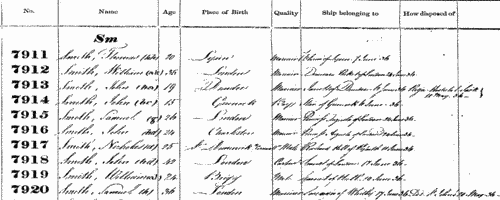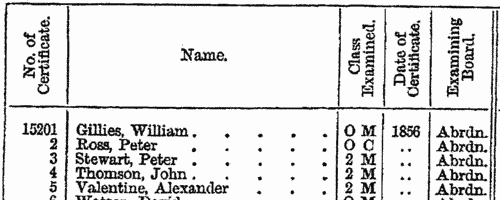Groundwater Surname Ancestry ResultsOur indexes 1000-1999 include entries for the spelling 'groundwater'. In the period you have requested, we have the following 32 records (displaying 1 to 10): Single Surname Subscription | | | Buying all 32 results of this search individually would cost £180.00. But you can have free access to all 32 records for a year, to view, to save and print, for £100. Save £80.00. More... |
These sample scans are from the original record. You will get scans of the full pages or articles where the surname you searched for has been found. Your web browser may prevent the sample windows from opening; in this case please change your browser settings to allow pop-up windows from this site. Masters of Merchantmen
(1785)
The Daily Universal Register of February 1785 includes a section entitled Ship News. This is compiled from reports from Portsmouth, Deal, Milford, Poole, Standgate Creek and Gravesend as to merchant shipping movements; news of losses and sightings coming in from various ports; a list of Ships Arrived in the (London) River, in the Clyde, in the Downs, off Beachy Head, off Dover, off Poole, at Alicante, Amsterdam, Ancona, Baltimore, Barbadoes, Belfast, Bilbao, Bordeaux, Boston (New England), Bristol, Bryar, Cadiz, Campvere, Charlestown, Cork, Cowes, Creek, Cuxhaven, Dartmouth, Dominica, Dover, Dublin, Dunkirk, Falmouth, Faro, Gibraltar, Glendore, Grenada, Halifax (Nova Scotia), Havre de Grace, Helvoetsluys, Hull, Kinsale, Lancaster, Leghorn, Leith, Lisbon, Liverpool, Londonderry, Lough Ryan, Margate, Milford, Mogador, Naples, New York, Newcastle (on Tyne), Newry, Ostend, Penzance, Philadelphia, Plymouth, Poole, Portsmouth, Rotterdam, St Domingo, St Kitts, St Lucar, St Lucia, St Marks, Scilly, Sealock, Smyrna, Standgate Creek, Tenerife, Texel, Waterford, Zeirickser, and in 'Africa', the Isles de Lo's, Jamaica, North Carolina and Virginia; and Reports of Ships made at the Custom House in London. Except in the home ports, the register refers only to British shipping: each ship is usually identified merely by its name, and the master's surname, although masters' christian names are given occasionally. Naval vessels are mentioned rarely, and their captains' names not usually stated. GROUNDWATER. Cost: £6.00.  | Sample scan, click to enlarge

| Masters of Merchantmen
(1785)
The Daily Universal Register of January 1785 includes a section entitled Ship News. This is compiled from reports from Portsmouth, Deal, Poole and Gravesend as to merchant shipping movements; news of losses and sightings coming in from various ports; a list of Ships Arrived in the (London) River, in the Clyde, in the Downs, in the Humber, in Bantry Bay, off Beachy Head, off Beer Haven, off Cape Clear, off Cape Fear, off Hastings, off Hilston, off Portland, off Porto Bar, off Scilly, at Alicante, Ancona, Antigua, Baltimore, Barbadoes, Belfast, Bilbao, Bonny, Bordeaux, Boulogne, Bremen, Brighthelmstone (Brighton), Bristol, Cadiz, Cape Breton, Cartagena, Charlestown, Chester, Constantinople, Cork, Corunna, Cowes, Creek, Crookhaven, Dantzig, Dartmouth, Dominica, Dover, Dublin, Exeter, Falmouth, Faro, Figuera, Genoa, Gibraltar, Gottenburg, Greenock, Grenada, Halifax (Nova Scotia), Havannah, Hoylake, Hull, Jersey, Killybegs, Lancaster, Leghorn, Leith, Limerick, Lisbon, Liverpool, Londonderry, L'Orient, Lowestoft, Madeira, Madras, Milford, Minorca, Mogador, Naples, New Calabar, New Providence (Bahamas), New York, Newry, Nice, Old Calabar, Oporto, Ostend, Peel, Penzance, Philadelphia, Piscatequa, Plymouth, Pondicherry, Port Roseway, Porto, Portsmouth, Rochelle, Ross, Rotterdam, St Kitts, St Lucia, St Michael, St Vincents, Savannah, Scarborough, Southampton, Tenerife, Texel, Tobago, Torbay, Vigo, Waterford, Whitehaven, and in 'Africa', Angola, Grenadoes, Honduras, the Isle of Wight, Jamaica, Maryland, New England, Newfoundland, Philadelphia and Virginia; and Reports of Ships made at the Custom House in London. Except in the home ports, the register refers only to British shipping: each ship is usually identified merely by its name, and the master's surname, although masters' christian names are given occasionally. Naval vessels are mentioned rarely, and their captains' names not usually stated. GROUNDWATER. Cost: £6.00.  | Sample scan, click to enlarge

|  Apprentices and clerks
(1803) Apprentices and clerks
(1803)
Apprenticeship indentures and clerks' articles were subject to a 6d or 12d per pound stamp duty: the registers of the payments usually give the master's trade, address, and occupation, and the apprentice's name, as well as details of the date and length of the apprenticeship. 3 January to 31 December 1803. IR 1/39GROUNDWATER. Cost: £8.00.  | Sample scan, click to enlarge

|  British merchant seamen
(1835-1836) British merchant seamen
(1835-1836)
At this period, the foreign trade of ships plying to and from the British isles involved about 150,000 men on 15,000 ships; and the coasting trade about a quarter as many more. A large proportion of the seamen on these ships were British subjects, and so liable to be pressed for service in the Royal Navy; but there was no general register by which to identify them, so in 1835 parliament passed a Merchant Seamen's Registration Bill. Under this act this large register of British seamen was compiled, based on ships' crew lists gathered in British and Irish ports, and passed up to the registry in London. Each seaman was assigned a number, and the names were arranged in the register by first two letters of the surname (our sample scan shows one of the pages for 'Sm'); in addition, an attempt was made to separate out namesakes by giving the first instance of a name (a), the second (b), and so on. But no effective method was devised to prevent the same man being registered twice as he appeared in a second crew list; moreover, the original crew lists were clearly difficult for the registry clerks to copy, and some of the surname spellings appear to be corrupted. A parliamentary committee decided that the system devised did not answer the original problem, and this register was abandoned after less than two years: but it is an apparently comprehensive source for British merchant seamen in 1835 to 1836. The register records the number assigned to each man; his name; age; birthplace; quality (master, captain, mate, 2nd mate, mariner, seaman, fisherman, cook, carpenter, boy &c.); and the name and home port of his ship, with the date of the crew list (usually at the end of a voyage). Most of the men recorded were born in the British Isles, but not all (for instance, Charleston and Stockholm appear in the sample scan). The final column 'How disposed of' is rarely used, and indicates those instances where a man died, was discharged, or deserted his ship during the voyage.GROUNDWATER. Cost: £8.00.  | Sample scan, click to enlarge

| British in India and Ceylon, China and Australasia
(1836)
Births, marriages and deaths, civil, ecclesiastical and military promotions, furloughs, reports of shipping to and from England and the East, with passenger lists, and news items published in the Asiatic Journal
GROUNDWATER. Cost: £6.00.  | Sample scan, click to enlarge

| Passengers from Bombay to Aden and Suez (1838)
The Honourable East India Company's vessels Atalanta, Berenice, Hugh Lindsay, Victoria and Zenobia made monthly trips to the Red Sea via Aden. Lists of passengers were compiled before setting out from Bombay and registered when the ships reached Suez Roads.
GROUNDWATER. Cost: £8.00.  | Sample scan, click to enlarge

|  Sailors and marines awarded the Baltic Medal
(1854-1857) Sailors and marines awarded the Baltic Medal
(1854-1857)
During the Crimean War, a British and French fleet entered the Baltic, and captured Bomarsund harbour and one of the Aland Islands (now part of Finland). Bomarsund is the sound between the islands and the Swedish island of Vardo; and at the fine harbour on Bomarsund, dominating the entrance of the Gulf of Bothnia, and indirectly that of the Gulf of Finland, the Russians had constructed a northern naval base, and this was destroyed in the attack. The British fleet taking part in the Baltic expedition comprised Her Majesty's ships Aeolus, Ajax, Alban, Algiers, Amphion, Archer, Arrogant, Basilisk, Belleisle, Blenheim, Boscawen, Bulldog, Caesar, Calcutta, Centaur, Colossus, Conflict, Cornwallis, Cossack, Cressy, Cruizer, Cuckoo, Cumberland, Dauntless, Desperate, Dragon, Driver, Duke of Wellington, Edinburgh, Esk, Euryalus, Exmouth, Falcon, Firefly, Geyser, Gladiator, Gorgon, Hannibal, Harrier, Hastings, Hawke, Hecla, Hogue, Imperieuse, James Watt, Leopard, Lightning, Locust, Magicienne, Majestic, Merlin, Miranda, Monarch, Neptune, Nile, Odin, Orion, Otter, Pembroke, Penelope, Pigmy, Porcupine, Prince Regent, Princess Royal, Pylades, Resistance, Retribution, Rhadamanthus, Rosamond, Royal George, Royal William, Russell, St George, St Jean D'Acre, St Vincent, Sphinx, Stromboli, Tartar, Termagant, Tribune, Tyne, Valorous, Volage, Volcano, Vulture, Wrangler and Zephyr. This is the medal roll of the naval and marine claimants who qualified for the Baltic Medal for service in 1854 to 1855. The medals were dispatched in batches from early 1857, the first batch being numbered B A 1, the next B A 2, &c.; then follows the destination (a place or, more usually, a ship) and the date of dispatch. Most of the medals had been sent by the end of 1857.GROUNDWATER. Cost: £8.00.  | Sample scan, click to enlarge

| Masters and Mates of Merchantmen: Certificates of Competency
(1857)
The Mercantile Navy List and Annual Appendage to the Commercial Code of Signals for All Nations, edited by J. H. Brown, was published By Authority in 1857. It includes this full list of 'Masters and Mates who have passed their examination and obtained Certificates of Competency', from number 1 to number 15816, except for those whose certificates had been cancelled. The first column gives the number of certificate; the second column full name, surname first (an asterisk before the name denotes those who are found qualified to act in fore and aft-rigged vessels only; two vertical lines denotes in North Wales fishery only; a double dagger, passed the examination in steam; and a dagger refers to honorary testimonials, details of which are printed at the end of the section. A B C D are the distinguishing letters for the four classes of Meteorological Observers); third column, class examined (1 ex, 1, 2 and 3 denote First Extra, First, Second and Third Class Master's Certificate, granted under the Voluntary Examination, by Order in Council dated August 1845; Ex C, Master Extra; O C, Master Ordinary; 1 M, First Mate; O M, Only Mate; 2 M, Second Mate; L. R. N., Lieutenant Royal Navy; M. R. N., Master Royal Navy; E. I. C., East India Company; M. I. N., Master Indian Navy.); fourth column, year of certificate (where there are two dots, this is to represent a 'ditto' to the year next above); fifth column, Examining Board (Aberdeen, Belfast, Bristol, Cork, Dublin, Dundee, Glasgow, Greenock, Hull, Leith, Liverpool, London, Newcastle, Plymouth, Shields or Sunderland).GROUNDWATER. Cost: £4.00.  | Sample scan, click to enlarge

| Patentees of New Inventions
(1857)
Abstracts of British patents for new inventions applied for and granted from 1 January to 31 December 1857: giving date, name and address, and short description of the invention. It is then stated whether 'Letters patent sealed' or 'Provisional protection only'.GROUNDWATER. Cost: £6.00.  | Sample scan, click to enlarge

| Long-stay Paupers in Workhouses: Portsea Island
(1861)
This comprehensive return by the Poor Law Board for England and Wales in July 1861 revealed that of the 67,800 paupers aged 16 or over, exclusive of vagrants, then in the Board's workhouses, 14,216 (6,569 men, 7,647 women) had been inmates for a continuous period of five years and upwards. The return lists all these long-stay inmates from each of the 626 workhouses that had been existence for five years and more, giving full name; the amount of time that each had been in the workhouse (years and months); the reason assigned why the pauper in each case was unable to sustain himself or herself; and whether or not the pauper had been brought up in a district or workhouse school (very few had). The commonest reasons given for this long stay in the workhouse were: old age and infirm (3,331); infirm (2,565); idiot (1,565); weak mind (1,026); imbecile (997); and illness (493). GROUNDWATER. Cost: £6.00.  | Sample scan, click to enlarge

|
Research your ancestry, family history, genealogy and one-name study by direct access to original records and archives indexed by surname.
|













